#what is crm software
Explore tagged Tumblr posts
Text
What Is CRM Software and Why Does Your Business Need It?
What is CRM Software? It's more than an instrument; it's the key to building stronger connections with your clients increasing productivity and accelerating businesses to grow. From managing contacts, to automating follow-ups, and measuring the performance of sales CRM software allows companies of all sizes to stay in touch and provide outstanding customer experiences. Are you interested in learning how it can help your business grow as well? Read our blog to learn more about the reason why CRM software is an absolute essential tool in today's highly competitive market!

0 notes
Text
#call center dialer software#crm software#best crm software#call center dialer ]#crm software solution#what is crm software
0 notes
Text
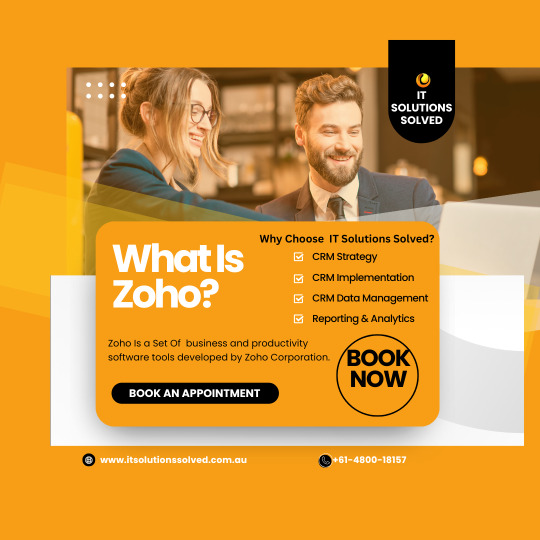
Discover Zoho CRM: A Game-Changer for Your Business
#what is zoho crm#what is zoho used for#what is zoho corporation#what does zoho#what is zoho software
0 notes
Text
What are the next steps after obtaining an insurance broker license, and how can you generate potential leads using Mzapp CRM software?
Congratulations on securing your insurance broker license! The journey doesn’t end here; it’s just the beginning of building a successful insurance brokerage. Here’s how you can proceed and leverage Mzapp CRM software to find potential leads:
Steps After Getting Your Insurance Broker License
Understand Your Market: Research your target audience (individuals, businesses, or specific sectors).
Develop a Business Plan: Set goals for client acquisition, revenue, and operational processes.
Build a Network: Partner with insurance providers and attend industry events to establish your presence.
Create an Online Presence: Build a professional website and maintain active profiles on social platforms.
Offer Value-Added Services: Educate customers on policies, claims management, and risk assessments.
Using Mzapp CRM Software to Generate Leads
Lead Capture: Utilize Mzapp’s integrated forms and web tracking tools to capture inquiries from your website or social media.
Automated Follow-Ups: Set up personalized email and SMS follow-ups to nurture leads effectively.
Lead Scoring: Prioritize leads based on their interaction history, ensuring you focus on high-potential prospects.
Data-Driven Campaigns: Use analytics to identify what works and launch targeted campaigns.
Seamless Policy Management: Impress leads by showcasing how smoothly you manage policies and claims through Mzapp.
Why Choose Mzapp CRM?
Mzapp CRM simplifies lead management, streamlines operations, and provides insights into customer behavior, making it easier to convert prospects into loyal clients.
Learn more about how Mzapp can transform your insurance business here.
#Question:#What are the next steps after obtaining an insurance broker license#and how can you generate potential leads using Mzapp CRM software?#Answer:#Congratulations on securing your insurance broker license! The journey doesn’t end here; it’s just the beginning of building a successful i#Steps After Getting Your Insurance Broker License#Understand Your Market: Research your target audience (individuals#businesses#or specific sectors).#Develop a Business Plan: Set goals for client acquisition#revenue#and operational processes.#Build a Network: Partner with insurance providers and attend industry events to establish your presence.#Create an Online Presence: Build a professional website and maintain active profiles on social platforms.#Offer Value-Added Services: Educate customers on policies#claims management#and risk assessments.#Using Mzapp CRM Software to Generate Leads#Lead Capture: Utilize Mzapp’s integrated forms and web tracking tools to capture inquiries from your website or social media.#Automated Follow-Ups: Set up personalized email and SMS follow-ups to nurture leads effectively.#Lead Scoring: Prioritize leads based on their interaction history#ensuring you focus on high-potential prospects.#Data-Driven Campaigns: Use analytics to identify what works and launch targeted campaigns.#Seamless Policy Management: Impress leads by showcasing how smoothly you manage policies and claims through Mzapp.#Why Choose Mzapp CRM?#Mzapp CRM simplifies lead management#streamlines operations#and provides insights into customer behavior#making it easier to convert prospects into loyal clients.#Learn more about how Mzapp can transform your insurance business here.
1 note
·
View note
Text

How to Use Data and Research in CSR Planning with TechCSR
Beyond enhancing brand reputation, effective CSR initiatives create tangible benefits for society. With TechCSR, companies can harness the power of data and research to plan, monitor, and evaluate their CSR initiatives efficiently, ensuring that their efforts generate measurable impact.
#Csr Software#Corporate Social Responsibility Csr Software#Csr Software Meaning#Csr Software Companies#Csr Software Tools#Csr Software Solution#Csr Software Development#Best Csr Software#What Is a Csr Software#Crm Software Explanation#Csr In Software Engineering#Software For Csr#Gis Based Csr Management#Csr Reporting Software#Csr Monitoring Software#Csr Tracking Software#Csr Management Software#Csr Management System#Csr Management App#Corporate Social Responsibility Software#Csr Management Platform
0 notes
Text
Unlocking HubSpot: Essential Basics for Sales and Marketing in 2025
youtube
0 notes
Text
What is CRM? A Comprehensive Guide
In today's fast-paced business world, managing customer relationships is crucial for success. This is where Customer Relationship Management (CRM) comes into play. But what exactly is CRM, and why is it so important? Let's dive in and explore this essential business tool.

Understanding CRM
CRM, or Customer Relationship Management, is a strategy and set of tools that businesses use to manage and analyze customer interactions throughout the customer lifecycle. The goal is to improve business relationships, increase customer retention, and drive sales growth.
At its core, CRM is about understanding your customers better and using that knowledge to provide them with a superior experience. It's not just a piece of software; it's a holistic approach to customer relations that can transform the way your business operates.
The Components of CRM
A comprehensive CRM system typically includes several key components:
Contact Management: This is the foundation of any CRM system. It allows businesses to store and organize customer information, including contact details, communication history, and purchase records.
Lead Management System: This component helps businesses track and nurture potential customers through the sales process. It allows sales team to prioritize leads, track interactions, and move prospects through the sales funnel more effectively.
Sales Pipeline: The Sales Pipeline is a visual representation of where potential customers are in the buying process. It helps sales teams forecast future sales and identify bottlenecks in the sales process.
Sales Process: A well-defined sales process is crucial for consistent success. CRM systems often include tools to help businesses define, implement, and optimize their sales processes.
Analytics and Reporting: CRM systems provide valuable insights through data analysis and reporting. This helps businesses make informed decisions and continuously improve their customer relationships.
The Benefits of CRM
Implementing a CRM system can bring numerous benefits to a business:
Improved Customer Service: With all customer information centralized and easily accessible, businesses can provide faster, more personalized service.
Increased Sales: By providing a clear view of the sales pipeline and helping to streamline the sales process, CRM can significantly boost sales performance.
Better Customer Retention: CRM helps businesses understand their customers better, leading to improved relationships and higher retention rates.
Data-Driven Decision Making: The analytics capabilities of CRM systems enable businesses to make decisions based on hard data rather than gut feeling.
Improved Efficiency: By automating many routine tasks, CRM frees up time for employees to focus on more valuable activities.
Types of CRM Software
There are several types of CRM software available, each catering to different business needs:
Operational CRM: This type focuses on automating and improving customer-facing business processes, including sales, marketing, and customer service.
Analytical CRM: This type emphasizes analyzing customer data to gain insights and improve decision-making.
Collaborative CRM: This type aims to improve communication and collaboration between different departments within a business, ensuring a seamless customer experience.
Sales CRM: As the name suggests, this type is specifically designed to support sales teams, with features like lead management, sales forecasting, and pipeline management.
Implementing CRM in Your Business
Implementing a CRM system can seem daunting, but with the right approach, it can be a smooth process:
Define Your Goals: Before choosing a CRM system, clearly define what you want to achieve with it.
Choose the Right System: There are many CRM solutions available. Choose one that aligns with your business needs and goals.
Prepare Your Data: Clean and organize your existing customer data before migrating it to the new system.
Train Your Team: Ensure all users are properly trained on how to use the new system.
Start Small and Scale: Begin with core features and gradually expand as your team becomes more comfortable with the system.
The Future of CRM
As technology continues to evolve, so does CRM. Here are some trends shaping the future of CRM:
AI and Machine Learning: These technologies are being integrated into CRM systems to provide more accurate predictions and personalized recommendations.
Mobile CRM: With more work being done on-the-go, mobile CRM applications are becoming increasingly important.
Social CRM: Integration with social media platforms is allowing businesses to engage with customers where they spend a lot of their time.
Customer Experience Management: CRM is evolving beyond just managing relationships to focus on the entire customer experience.
Conclusion
In today's customer-centric business environment, CRM is no longer a luxury—it's a necessity. Whether you're a small startup or a large corporation, implementing a CRM system can help you better understand your customers, streamline your processes, and ultimately drive business growth.
Remember, CRM is not just about technology; it's about people and processes too. The most successful CRM implementations are those that align technology with business strategy and organizational culture.
As you consider implementing or upgrading your CRM system, keep in mind the key components we've discussed: contact management, lead management, sales pipeline visualization, and sales process optimization. With the right CRM solution and implementation strategy, you can transform your customer relationships and take your business to new heights.
In the end, CRM is about putting your customers at the heart of your business. By leveraging the power of CRM, you can create more meaningful, profitable, and long-lasting relationships with your customers. And in today's competitive business landscape, that could make all the difference.
0 notes
Text
why is it so hard to think about soft skills to put on a resume T — T
#what do i write: obsessive & ill ???? pls i cannot bring myself to type detail-oriented 😭😭😭#sensitive & cries easily is way more accurate than highly organized plsss#okay but i HAVE been doing work similar to admin assistant for my mom since like age 16(?) so i do have experience with coordinating w staff#revising proofreading and even creating papers and representing her and her clients in government and private establishments like SSS#but soft skills.....girl WHAT#soft skill no.1: can tolerate and be nice to mean people but cry my fucking eyeballs out afterwards 😭⁉️⁉️⁉️#technical skills are way more defined bc they're softwares/cloud softwares like gsheets or crm stuff like click-up#but when it comes to my core traits that are relevant in a work setting......AAAARGHHHHH MAYBE PATIENT IS OKAY??#BUT MORE LIKE MENTAL PATIENT B IVE BEEN IN THE WARD TWICE NOW XUSUSHSHHWHWHHSHW PLS
1 note
·
View note
Text
youtube
What is CRM? In this video, we'll explore the fundamentals of Real Estate CRM and how it can revolutionize the way you manage your business. Let's break it down.
0 notes
Text
Top five crm software compared with table
CRM software is an essential tool for businesses of all sizes to manage customer relationships and improve sales. With so many options available, it can be challenging to choose the right CRM software for your business. In this article, we will compare the top five CRM software options to help you make an informed decision.
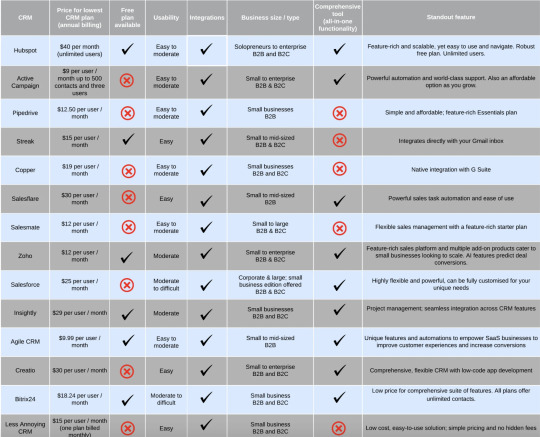
1. HubSpot CRM
HubSpot CRM is a popular CRM software that offers a range of features to help businesses manage their customer relationships. It is a free CRM solution that is easy to use and offers a range of integrations with other business tools. HubSpot CRM is best suited for small to medium-sized businesses.
Pros
HubSpot CRM is a free solution that offers a range of features to help businesses manage their customer relationships.
It is easy to use and offers a range of integrations with other business tools.
HubSpot CRM offers a range of marketing and sales tools to help businesses improve their sales and marketing efforts.
It offers a user-friendly interface that makes it easy to navigate and find the tools you need.
Cons
HubSpot CRM may not be the best option for larger businesses that need more advanced features and tools.
Some users may find the free version to be limited in terms of features and functionality.
2. Salesforce
Salesforce is one of the most popular CRM software options available. It is a cloud-based solution that offers a range of features and tools to help businesses manage their customer relationships. Salesforce is best suited for medium to large-sized businesses.
Pros
Salesforce offers a range of features and tools to help businesses manage their customer relationships.
It is a cloud-based solution that can be accessed from anywhere.
Salesforce offers a range of integrations with other business tools.
It offers a user-friendly interface that makes it easy to navigate and find the tools you need.
Cons
Salesforce can be expensive, especially for smaller businesses.
Some users may find the interface to be overwhelming at first, as there are many features and tools to explore.
3. Freshsales
Freshsales is a comprehensive and smart solution to discover leads and boost engagement. It is a cloud-based solution that offers a range of features and tools to help businesses manage their customer relationships. Freshsales is best suited for small to medium-sized businesses.
Pros
Freshsales offers a range of features and tools to help businesses manage their customer relationships.
It is a cloud-based solution that can be accessed from anywhere.
Freshsales offers a range of integrations with other business tools.
It offers a user-friendly interface that makes it easy to navigate and find the tools you need.
Cons
Freshsales may not be the best option for larger businesses that need more advanced features and tools.
Some users may find the pricing to be expensive, especially for smaller businesses.
4. Zoho CRM
Zoho CRM is a classic full-stack CRM that helps businesses of all sizes work and scale. It is a cloud-based solution that offers a range of features and tools to help businesses manage their customer relationships. Zoho CRM is best suited for small to medium-sized businesses.
Pros
Zoho CRM offers a range of features and tools to help businesses manage their customer relationships.
It is a cloud-based solution that can be accessed from anywhere.
Zoho CRM offers a range of integrations with other business tools.
It offers a user-friendly interface that makes it easy to navigate and find the tools you need.
Cons
Zoho CRM may not be the best option for larger businesses that need more advanced features and tools.
Some users may find the interface to be overwhelming at first, as there are many features and tools to explore.
5. Less Annoying CRM
Less Annoying CRM is a simple CRM built just for small businesses and their teams. It is a cloud-based solution that offers a range of features and tools to help businesses manage their customer relationships. Less Annoying CRM is best suited for small businesses.
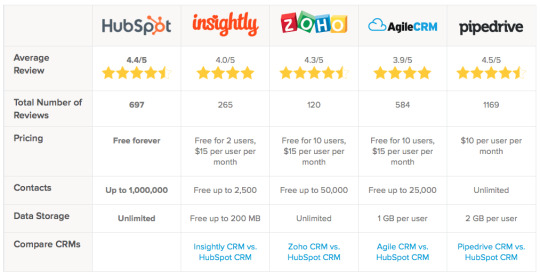
Pros
Less Annoying CRM is a simple and easy-to-use solution that is built just for small businesses.
It is a cloud-based solution that can be accessed from anywhere.
Less Annoying CRM offers a range of integrations with other business tools.
It offers a user-friendly interface that makes it easy to navigate and find the tools you need.
Cons
Less Annoying CRM may not be the best option for larger businesses that need more advanced features and tools.
Some users may find the pricing to be expensive, especially for smaller businesses.
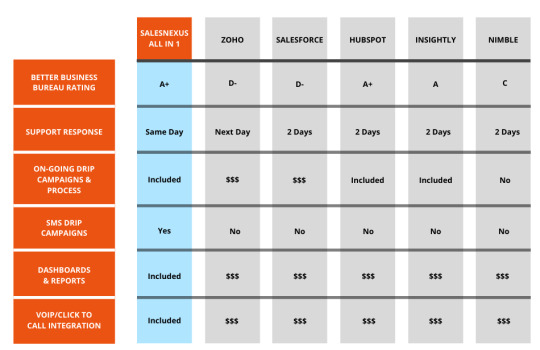
In conclusion, these five CRM software options offer a range of features and tools to help businesses manage their customer relationships. HubSpot CRM is a free solution that is best suited for small to medium-sized businesses. Salesforce, Freshsales, and Zoho CRM are cloud-based solutions that offer a range of features and tools to help businesses manage their customer relationships. Less Annoying CRM is a simple and easy-to-use solution that is built just for small businesses. By comparing these five CRM software options, you can choose the one that best fits your business needs.
#crm software#software crm#10 best crm software#software crm system#how to make crm software#what is the best crm software#how to use crm software#is crm a software#famous crm software#how to sell crm software#what does crm software stand for#does google have a crm software#does google have crm software#what is crm software stand for#what does crm software mean#how much does crm software cost#what does crm stand for in software#what does crm software do#what crm software does#what is crm software used for#what are the best crm software#which crm software is best#how to learn crm software#what is the most commonly used crm software right now#what are crm software#what are some popular crm software#what features should a crm have#what are the types of crm software#how crm software works#how much is crm software
0 notes
Text
What Is CUSTOMER RELATIONSHIP MANAGEMENT?
In the fast-paced world of modern business, establishing and nurturing relationships has become a fundamental goal. This is where Customer Relationship Management (CRM) steps in, armed with the potential to transform potential customers into loyal advocates through an effective lead management strategy. Understanding Customer Relationship Management (CRM) Customer Relationship Management (CRM) isn't just software; it's a holistic strategy focused on understanding, engaging, and serving customers. Realkeeper CRM is used for converting leads into deals. Central to this strategy is lead management – a process that guides potential customers from initial contact to becoming loyal patrons. The Significance of Effective Lead Management Effective lead management within CRM is pivotal for several reasons:
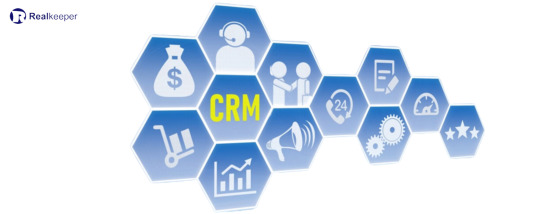
Maximizing Potential: Efficient lead management ensures that no potential opportunity goes unnoticed. It enables businesses to seize every lead, regardless of where they are in the sales journey. Streamlined Communication: CRM systems offer a centralized platform for tracking and engaging with leads. This ensures consistent and personalized interactions that resonate with potential customers.
Targeted Engagement: By categorizing leads based on their preferences and behaviors, businesses can tailor engagement strategies. This leads to higher engagement rates and an increased likelihood of conversion.
Lead Scoring: CRM systems enable lead scoring, assigning scores based on interactions and engagement. This helps sales teams focus on leads with higher conversion potential, enhancing efficiency.
Crafting an Effective Lead Management Strategy Developing an effective lead management strategy is crucial for handling new leads. Uncover the strategies and best practices that ensure your CRM software becomes a tool for converting new leads into loyal customers.
A synergy of CRM and Effective Lead Management The synergy between CRM and effective lead management is undeniable. CRM systems provide tools and insights for seamless lead management execution. They ensure potential customers receive relevant content, progress through the sales funnel, and evolve into loyal customers.
#crm#crm for small business#crm software#leadmanagement#potential customers#What is CUSTOMER RELATIONSHIP MANAGEMENT?
1 note
·
View note
Note
Thank you @sparklypurplerock !! (Yes, she’s brilliant and hilarious and has fabulous taste in movies. :D)
Hey, sorry to bother you, but you seem to reblog a lot of good life advice posts. I was wondering if you have any good advice for making cover letters and resumes or could point me in the direction of some posts on the subject?
Oh, thank you very much! I’ve actually spent my whole adult life in volunteer/community funded positions and have no experience applying! But I’ll tag my friend @sparklypurplerock who has more experience — do you have the spoons for any advice/links for nonny?
I did think this post seemed comprehensive and direct.
Anyone else reading — what helped you most?
35 notes
·
View notes
Text
This article explains what nobody says out loud about sales systems.
10 notes
·
View notes
Text
Discover Zoho CRM: A Game-Changer for Your Business
#what is zoho crm#what is zoho used for#what is zoho corporation#what does zoho#what is zoho software
0 notes
Text
One24: The All-in-One Platform Transforming Business Operations for IT Companies

Key Features That Set One24 Apart 🧠 Smart HRMS Handle everything from hiring, onboarding, attendance, and leave to appraisals and payroll. Say goodbye to spreadsheets and hello to automation.
📊 Project & Task Management Keep projects on track with real-time updates, sprint boards, deadline tracking, and team collaboration tools—all visible in a single dashboard.
💻 IT Asset & Hardware Management Track and manage your entire hardware inventory, software licenses, and IT tickets. Prevent asset loss, improve compliance, and control costs.
📈 Sales CRM Manage leads, pipeline stages, and client communication. Get real-time insights into your sales cycle and close deals faster.
📉 AI Analytics & Business Intelligence Leverage powerful, AI-driven analytics that turn raw data into smart decisions. Identify trends, predict risks, and track team performance with ease.
🔄 Automation & Notifications Automate repetitive workflows like approvals, reminders, and compliance checks so your teams can focus on what really matters—innovation and growth.
2 notes
·
View notes
Text

How to Choose the Best CRM Software for Your Business
Choosing the right CRM software for your business is a big decision — and the right one can make a world of difference. Whether you’re running a small startup or managing a growing company, having an effective CRM (Customer Relationship Management) system helps you keep track of customers, boost sales, and improve overall productivity. Let’s walk through how you can choose the best CRM for your business without getting overwhelmed.
Why Your Business Needs a CRM
A CRM isn’t just a tool — it’s your business’s central hub for managing relationships. If you’re still relying on spreadsheets or scattered notes, you’re probably losing time (and leads). A good CRM helps you:
Keep customer data organized in one place
Track leads, sales, and follow-ups
Automate routine tasks
Get insights into sales performance
Improve customer service
The goal is simple: work smarter, not harder. And with an affordable CRM that fits your needs, you’ll see faster growth and smoother processes.
Define Your Business Goals
Before diving into features, figure out what you actually need. Ask yourself:
Are you trying to increase sales or improve customer service?
Do you need better lead tracking or marketing automation?
How big is your team, and how tech-savvy are they?
What’s your budget?
Knowing your goals upfront keeps you from wasting time on CRMs that might be packed with unnecessary features — or worse, missing key ones.
Must-Have Features to Look For
When comparing CRM options, focus on features that truly matter for your business. Here are some essentials:
Contact Management – Store customer details, interactions, and notes all in one place.
Lead Tracking – Follow leads through the sales funnel and never miss a follow-up.
Sales Pipeline Management – Visualize where your deals stand and what needs attention.
Automation – Save time by automating emails, reminders, and data entry.
Customization – Adjust fields, workflows, and dashboards to match your process.
Third-Party Integrations – Ensure your CRM connects with other software you rely on, like email marketing tools or accounting systems.
Reports & Analytics – Gain insights into sales, performance, and customer behavior.
User-Friendly Interface – If your team finds it clunky or confusing, they won’t use it.
Budget Matters — But Value Matters More
A CRM doesn’t have to cost a fortune. Plenty of affordable CRM options offer robust features without the hefty price tag. The key is balancing cost with value. Don’t just chase the cheapest option — pick a CRM that supports your business growth.
Take LeadHeed, for example. It’s an affordable CRM designed to give businesses the tools they need — like lead management, sales tracking, and automation — without stretching your budget. It’s a smart pick if you want to grow efficiently without overpaying for features you won’t use.
Test Before You Commit
Most CRMs offer a free trial — and you should absolutely use it. A CRM might look great on paper, but it’s a different story when you’re actually using it. During your trial period, focus on:
How easy it is to set up and start using
Whether it integrates with your existing tools
How fast you can access and update customer information
If your team finds it helpful (or frustrating)
A trial gives you a real feel for whether the CRM is a good fit — before you commit to a paid plan.
Think About Long-Term Growth
Your business might be small now, but what about next year? Choose a CRM that grows with you. Look for flexible pricing plans, scalable features, and the ability to add more users or advanced functions down the line.
It’s better to pick a CRM that can expand with your business than to go through the hassle of switching systems later.
Check Customer Support
Even the best software can hit a snag — and when that happens, you’ll want reliable support. Look for a CRM that offers responsive customer service, whether that’s live chat, email, or phone. A system is only as good as the help you get when you need it.
Read Reviews and Compare
Don’t just rely on the CRM’s website. Read reviews from other businesses — especially ones similar to yours. Sites like G2, Capterra, and Trustpilot offer honest insights into what works (and what doesn’t). Comparing multiple CRMs ensures you make a well-rounded decision.
The Bottom Line
Choosing the best CRM software for your business doesn’t have to be complicated. By understanding your goals, focusing on essential features, and keeping scalability and budget in mind, you’ll find a CRM that fits like a glove.
If you’re looking for an affordable CRM Software that checks all the right boxes — without cutting corners — LeadHeed is worth exploring. It’s built to help businesses like yours manage leads, automate tasks, and gain valuable insights while staying within budget.
The right CRM can transform how you run your business. Take the time to find the one that supports your growth, keeps your team organized, and helps you deliver an even better experience to your customers.
3 notes
·
View notes